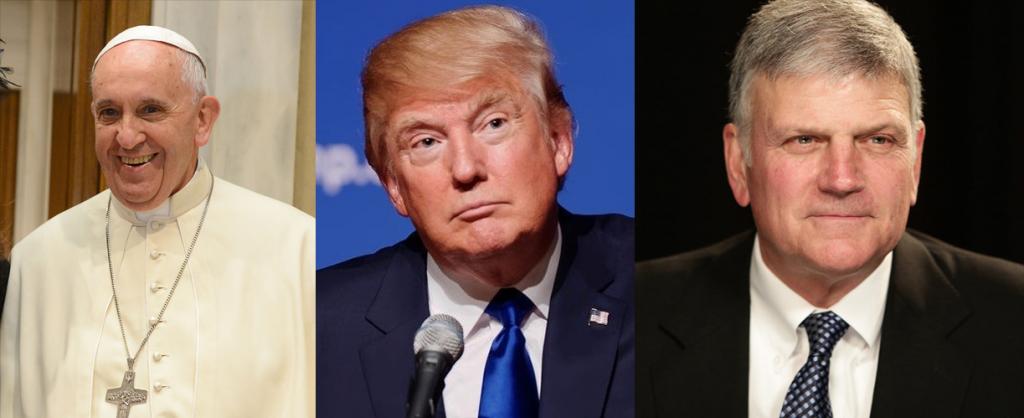Yesterday the Internet blew up when Pope Francis dropped this truth bomb on Republican presidential candidate Donald Trump…
A person who thinks only about building walls, wherever they may be, and not building bridges, is not Christian. This is not the gospel.
Not surprisingly, The Donald™ wasn’t too thrilled with the Pope’s criticism of his conveniently newfound faith. Calling the Pope’s comments “disgraceful,” Trump went on to claim that Pope Francis “would have only wished and prayed that Donald Trump would have been president” in the (in Trump’s mind inevitable) event that ISIS crosses the Tiber and takes over the Vatican.
Also not surprisingly, Facebook hot take extraordinaire Franklin Graham couldn’t help but weigh in and defend the candidate he clearly supports but for whatever reason can’t bring himself to endorse. In his latest bold stand for the faithful, Graham had this to say…
I agree that as Christians we should try to build bridges with everyone that we possibly can, but that doesn’t mean that we should compromise our national security….My advice to the Pontiff—reach out and build a bridge to Donald Trump. Who knows where he may be this time next year!
Though Pope Francis being interested in Franklin Graham’s advice is about as likely as Donald Trump being President of the United States “this time next year,” I personally found Graham’s comments fascinating or at least revealing when put alongside what both the Pope and The Donald™ had to say.
To me, they almost perfectly capture the 3 versions of Christianity which shape the Christian faith in these here United States of America. Of course, though distinct, there is some bleeding over between the 3. But that being said, I think these 3 men and their versions of the faith offer an important snapshot of Christianity today or if you will, since we are in an election year, a State of The Faith.
In The Donald™’s response (to say nothing of everything else he has said and done in his campaign) we see a wonderful example of culturally convenient Christianity. Growing up in the Bible Belt, I saw this sort of expression of faith a lot. It’s a nominal sort of Christianity that folks embrace because of the pressure or expectations of the culture they find themselves in. Given how Christian identity in America is nearly exhausted by self-identification, identifying yourself as a Christian can make life a whole lot easier in certain cultural settings like the Bible Belt…or the Republican Party. Fortunately for folks like The Donald™, whether you actually practice that faith is ultimately and pragmatically irrelevant so long as you say the right words. Which is why, like many other right of center politicians, Donald Trump can take things one step further. Savvy enough to recognize the type of voters he needs to win his party’s nomination, The Donald™’s conveniently newfound faith not only lets him slip more easily into his chosen culture and deflect unwanted flack, it also offers the added benefit of providing him with a more sure path to power. That’s not to say I think he will be the next President. He almost certainly won’t be, but his political maneuvering and religious pandering is a great example of why culturally convenient Christianity can be so appealing: it comes with a great benefit plan.
In Franklin Graham’s comments, we see quintessential American Christianity distilled down to it’s very essence: “I agree with what Jesus said [or did], but…” Or as someone once put it, “I follow Jesus – up to a point.” Of course, it’s not always just one point or one “but.” More often than not, there are several exit points from the path of true discipleship. Not always at the same time. It depends on the particular challenge we’re facing that day.
I’ll follow Jesus, but I’m not giving away my money.
I’ll follow Jesus, but I’m not gonna just turn the other cheek.
I’ll follow Jesus, but I’m not hanging around those people.
It’s a different “but” for everyone, but I think Franklin Graham captures the most common stumbling block in American Christianity today: “I’ll follow Jesus, but when it comes to security…” Jesus made some scandalous claims in his day and called his followers to do things that sound, well, kind of ridiculous if not altogether terrifying. But nothing today rattles the faith of American Christians more than Jesus’ call to love our enemies and his radical commitment to nonviolence. Despite Christ’s call to peacemaking, our insatiable need for security – in every sense of the word – has allowed much of Christianity in America to be taken over by the political right and it’s promise of protection. It’s this willingness to compromise whenever it’s personally expedient that makes American Christianity almost Christianity. It’s almost authentically Christian in that there are many elements of the gospel present, but ultimately American Christianity is focused on serving the self, not serving Jesus. It may begin with a decision to follow Jesus, but the commitment to true discipleship ends whenever and whenever following Jesus becomes too costly.
Finally, in the Pope’s initial remarks we see authentic Christianity on full display. His words demonstrate an authentic form of the faith in that they express an unwavering commitment to the radically and fundamentally inclusive nature of the gospel. Following Jesus requires a certain amount of boldness and a willingness to adhere to the gospel no matter the cost and no matter how unpopular it might (or will) be to do so. Pope Francis is far from perfect and the faith he practices is absolutely not above critique. But his fundamental and unwavering commitment to loving and embracing the other is the very heart of the gospel. The faith of folks like Pope Francis isn’t authentic Christianity because everything he says and does perfectly adheres to the life and teaching of Jesus. It’s authentic Christianity because in everything he says and does he seeks to faithfully follow the life and teaching of Jesus no matter how much it may cost him personally to do so.
Now, it goes with out saying that it’s pretty easy to spot the culturally convenient Christianity of folks like Donald Trump, just like the Pope’s authentic Christianity is easy to admire and profess allegiance to.
But easiest of all is our ability to slip into the warm embrace of almost Christianity without even realizing it. Like Franklin Graham, we all admire the dedication and passion of folks like the Pope and obviously we love Jesus, but the prospect of being able to embrace Jesus while also putting our trust in Caesar is simply too seducing to overcome – even if Jesus himself said doing so is impossible. This sort of unholy merger doesn’t happen all at once, but slowly but surely, bit by bit we chip away at the Faith through convenient reinterpretations of Jesus’ teachings when the need arises or, if expedient exegesis won’t do the job, we can always simply ignore what Jesus said and did with the blessing of Common Sense.
As I said before, there’s some bleed over effect in these 3 versions of the faith. Trump’s culturally convenient faith is also profoundly American. There are elements of authentic discipleship in Graham’s almost Christianity. And even the Pope’s authentic Christianity is not without it’s moments of regrettable cultural influence.
None of us practice a pure, unadulterated version of Christianity no matter how much we would like to believe otherwise.
Nevertheless, we would all do well to recognize the stark contrast in the words and actions that define the faith of these men and ask where our own faith lies.
Of course we all profess to be authentic disciples of Jesus, but do our words and deeds actually emulate the life and teaching of Jesus?
Or do we follow Jesus merely when it’s convenient and only up to point?













